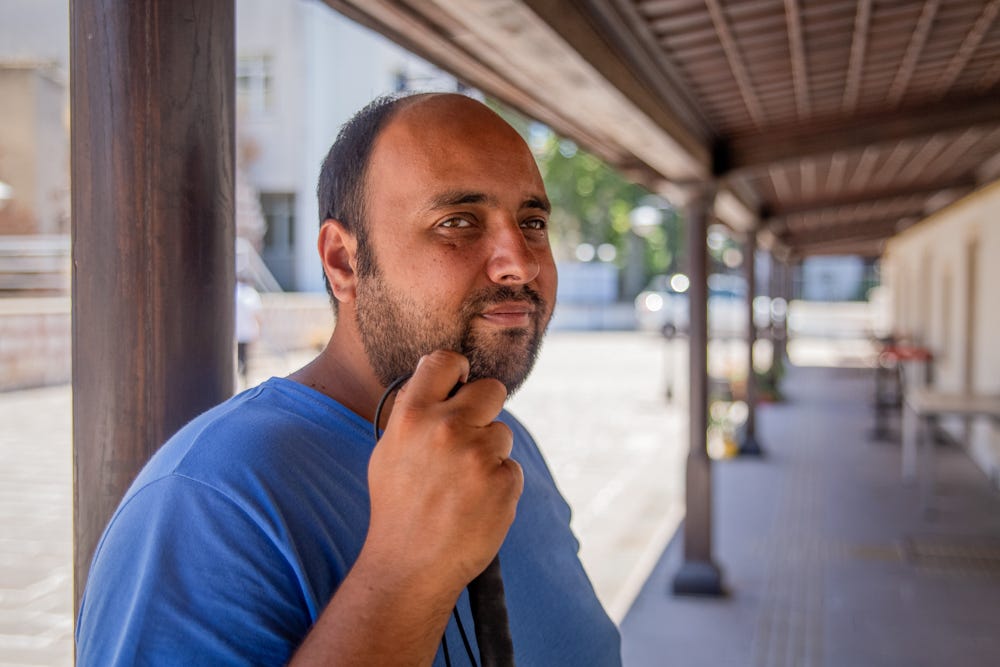In tough economic times, Turkey's citizens with disabilities face dwindling financial support

At Ankara University, 19-year-old law student Melike Bal strives to distinguish herself among peers so employers won’t overlook her after graduation. She eagerly showcases her near-native English language skills while taking part in numerous social causes.
Yet despite these efforts, she grapples with worries about her employment prospects due to her cerebral palsy, a neurological disorder affecting body movement and coordination.
"I feel like I won't be able to fully participate in the job market because of the physical barriers in society," she told Turkey recap.
Bal aspires to intern for an attorney, but the role's physical demands – and the constant movement it requires – raise apprehensions as she currently depends on her mother for mobility.
"My mom takes me into the classroom and even places me in the chair," she said.
Bal is one of many individuals with disabilities that face challenges in securing jobs. Particularly in recent years, the pressure to get a job has been felt more sharply as Turkey’s economic downturn has rendered unemployment highly precarious for disabled citizens that have watched their social safety net dissolve under rampant inflation.
State-issued benefits like disability wages and family caregiver salaries have failed to keep up with rising costs in Turkey, posing real problems for disabled individuals whose financial support is directly tied to wage policies and questionable inflation data.
In June, the Turkish government hiked minimum wage by 34 percent to 11,402 TL in effort to offset citizen’s declining purchasing power as inflation hovered around 38 percent officially and 108 percent unofficially that month.
Yet, days later, the roughly 640,000 Turkish citizens receiving disability wages saw an increase of about 17.5 percent.
Disability wages are split into two groups based on the severity of the condition. Recipients with a disability rating of 40-69 percent now receive 1,874 TL a month. Those with a rating over 70 percent receive 2,811 TL a month.
Bal, who has received the lowest tier of disability wages alongside an electricity allowance since she turned 18 years old, said the current salary rates were not enough.
“They are pretending as if this is a livable wage. It's nothing!” Bal said. “It wouldn’t be sufficient for me to live on my own.”
Financial support woes
Süleyman Akbulut, the head of Social Rights and Research Association (TOHAD), which advocates for at-risk social groups, confirmed that while an overwhelming proportion of people with disabilities live in economic deprivation and poverty, the current conditions are exacerbating their hardship.
“In this economic crisis, the disadvantaged and the poor suffer greatly,” Akbulut told Turkey recap. “However, a large number of disabled people are in a much more difficult situation than the non-disabled poor.”
Further aggravating the situation, disability benefits are indexed on civil servants' salary raises, resulting in relatively minor increases that fail to keep pace with the minimum wage and remain substantially below it.
To compare, in 2019, individuals in the lower tier of disability benefits received 23.76 percent of the minimum wage that year. In 2023, the same disability benefits tier dropped to 16.43 percent of the minimum wage, based on calculations by Turkey recap.
"If my father wasn’t able to work, we wouldn't be able to live on that disability salary. In winter, that would probably only cover heating and electricity," Bal said, adding she worries that her father's recent but slight wage increase might jeopardize her allowance.
To qualify for disability benefits, a household's per capita income must be less than one-third of the minimum wage. In practice, this means eligible families must have a monthly household income below the July poverty line, set at 37,974 TL.
Low employment rates
Parallel to the economic consequences of diminished financial support, the labor force participation rate for people with disabilities stands at 22.1 percent, almost half of the total labor participation rate of 53.6 percent as of March 2023, according to official figures.
More striking is that only 12.5 percent of women with disabilities are part of the workforce, compared to 35.4 percent of men with disabilities.
Still, some progress has been achieved on this front as the government has taken steps to increase employment opportunities in the last 20 years, implementing a 4 percent employment quota of disabled individuals for public institutions and 3 percent for the private sector.
Additionally, in 2011 the state introduced an EKPSS exam – which stands for “Disabled Public Personnel Selection Exam” and is designed to help disabled individuals obtain positions as civil servants.
Over the last two decades, the number of public employees with disabilities also rose from 5,777 in 2002 to 62,337 in 2021. Though many state-owned enterprises fall short of meeting the disability employment requirements, a report by Turkey's Court of Accounts revealed in January 2023.
The General Directorate of Turkish State Railways hired just 310 individuals with disabilities out of the required quota of 513.
Meanwhile, the 2022 EKPSS saw 46,454 applicants vying for civil servant positions, of which only 2,556 individuals could secure jobs, according to a separate report by Turkey’s Disabled Individuals Confederation.

Call center destiny
At the same time, current employment regulations create dissatisfaction among disability rights advocates due to potential imbalances that can favor specific disabilities.
Current regulations are based on a disability percentage-based system, where anyone rated 40 percent or above is categorized as disabled. However, this approach fails to account for the vast diversity within disabilities and how they can significantly impact a person's suitability for employment.
Offering one example, Fatih Karadayı, the head of Turkey's Visual Impaired Association, said an individual missing a thumb and a person that’s completely visually impaired, like himself, can sometimes be categorized under the same degree of disability.
"Which one would an employer prefer?" Karadayı asked
To correct potential inconsistencies, Karadayı advocates for the implementation of sub-quotas that consider both the severity and specificity of disability.
Yet visually impaired activist Ilgın Aydınoğlu maintains the EKPSS exam discriminates against people with disabilities more broadly, arguing it offers limited job options compared to the regular KPSS exam, which is open to all aspiring civil servants.
"All blind people will experience working at a call center one day," Aydınoğlu jokingly utters. "I mean, I have a finance degree and an international relations degree but [they] don't list jobs for those qualifications.”
"The problem is that [the government] views people with disabilities as 'Kardeş' (a sibling). But what does 'Kardeş' mean? It implies a younger sibling, someone who needs constant protection, care and guidance," said Seben Ayşe Dayı, a disability rights activist with cerebral palsy and co-founder of "Erişilebilir Her Şey," meaning “Everything Accessible”, a social enterprise that offers accessibility solutions and consultancy.
Cash-for-care scheme
Along with other benefits, the state introduced a cash-for-care scheme in 2007 to pay – mainly female relatives – who dedicate themselves to full-time home care for severely disabled family members.
While the program currently provides financial assistance to approximately 569,627 individuals, it has also been criticized for turning caregivers into domestic workers, who lack social security and who also see their indexed wages dwindle with inflation.
Although the cash-for-care wage was also hiked in June by 17.5 percent to 5,098 TL, it now represents about 44.7 percent of the minimum wage, down from 64 percent in 2019.
Complicating matters further, households with disabled individuals often cope with the so-called ‘extra cost of disability’. To maintain an equivalent standard of living to households without disabled members, they require at least an additional 14.6 percent of income, according to research conducted in 2020.
"A citizen can walk the distance of two bus stops, but for me, I have to take the bus since the sidewalks are not adequately designed to accommodate the needs of visually impaired or orthopedically handicapped individuals," Karadayı said.
He also noted the only phone he can effectively use due to its advanced accessibility features, the Apple iPhone, currently costs more than twice the monthly minimum wage for the cheapest model after recent tax hikes.
Akbulut said he did not believe the conditions for Turkey’s people with disabilities would improve in the near future.
“In Turkey, the government is neglecting people with disabilities because of the economic crisis,” Akbulut said. “The coming years, for people with disabilities, will be very dark … The state does not care, it will not care and the conditions will be even worse.”
Sustainable support
Squeezed between the lack of job prospects and meager allowances, Bal still sees herself as lucky compared to other people with disabilities. While she is making ends meet, she is mainly concerned about whether her dependence on her mother is sustainable – or fair – in the long run.
As a result, she is actively seeking out more independent living services, seeing it as the most viable path forward for herself and her relatives.
"I think if we're going to let people live independently with assistance, it would also be less of a strain on the national economy and would be more humane," Bal said, adding a personal assistant would directly ease her family's responsibilities while allowing her more opportunities to participate in society and the workforce.
However, in the absence of such options largely due to financial constraints, the law student perseveres by focusing less on what she can’t do and more on what she can do, like becoming so highly-qualified that no employer will be able to overlook her.
Currently, this means she is studying for an additional English-language exam and preparing to enroll in French classes after that.
“When they look for a legal intern, they look for someone who is probably physically able to do many, many things [and who can] go to a lot of places,” Bal said. “This might be a reason that they might not choose me.”
“But on the other hand, I'm trying to tell myself: Yes, maybe I won't be able to do those regular jobs, but I will be able to translate legal documents from English to Turkish or Turkish to English, and maybe even I'm going to add French to that.”
Turkey recap is an independent news platform supported by readers via Patreon and Substack. Supporters get access to our Slack channel, timelines, calendar and more.
We also invite you to visit our merch store, but if you simply liked what you’ve read, subscribe here or share it with a friend. Queries and pitches: info@turkeyrecap.com.
Diego Cupolo, co-founder + editor @diegocupolo
Gonca Tokyol, freelance journalist @goncatokyol
Ingrid Woudwijk, freelance journalist @deingrid
Verda Uyar, freelance journalist @verdauyar




